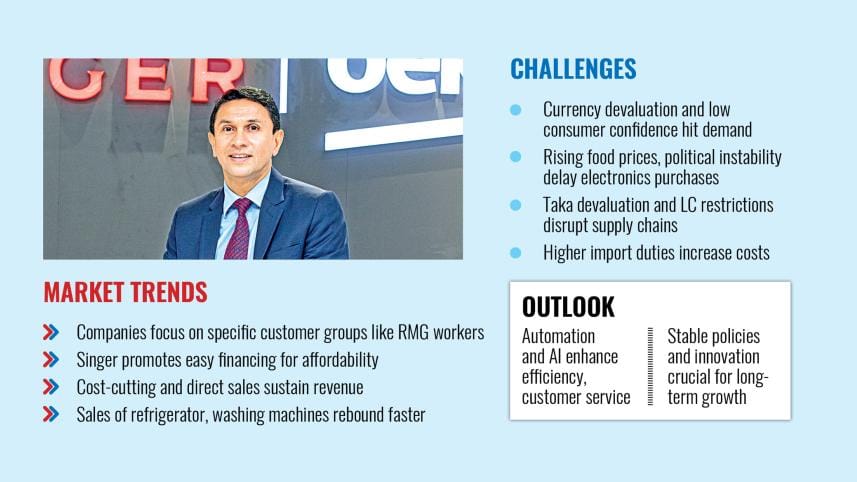Consumer uncertainty weighs on electronics sales

The electronics and home appliance sector in Bangladesh is facing one of its most challenging periods in recent years due to inflation, currency devaluation and declining consumer spending on non-essential items.
As households struggle with rising food prices and economic instability, demand for consumer electronics has significantly dropped.
This has forced home appliance companies like Singer Bangladesh to adjust their strategies to navigate these uncertain times, according to MHM Fairoz, managing director and CEO of Singer Bangladesh.
"Consumer uncertainty is a major factor affecting the electronics sector," Fairoz said in an interview with The Daily Star recently.
"Apart from rising costs, economic instability, political unrest, and concerns over law and order have led customers to postpone purchasing electronic items," he added.
According to the home appliance maker, businesses have also faced significant challenges due to foreign currency exchange issues. Many companies have struggled to open letters of credit (LCs), disrupting supply chains.
Besides, the devaluation of local currency taka and rising interest rates have compelled companies to increase product prices, further reducing consumer affordability.
Repeated flooding in the northeastern swathe of the country last year has also contributed to the slowdown in electronic sales, said Fairoz.
In spite of these challenges, there is cautious optimism for 2025. "Consumer confidence has started to show signs of improvement over the last few months," Fairoz said.
"Farmers and government employees, who receive bonuses or seasonal income, are the potential buyers," he noted. "By offering flexible payment schemes, we are encouraging purchases despite economic hardships."
Singer, known for its easy payment schemes, has leveraged its expertise to provide financing options that enable customers to buy products without paying the full amount upfront. "This approach has helped revive consumer demand in the electronics sector," Fairoz added.
Bangladesh remains heavily dependent on imports for electronic components, and the depreciation of the taka has significantly impacted costs.
"Over the past year, our currency has devalued by nearly 11 percent, leading to higher import costs," Fairoz pointed out. "Rising freight charges and increasing raw material costs have further contributed to price hikes."
Government policies have also played a role in shaping the sector. "The 2024 national budget increased import duties on essential components such as compressors for air conditioners and refrigerators."
Given the difficult economic climate, electronic manufacturers in Bangladesh have adopted different strategies to cope with declining sales. Major players like Singer, leveraging their parent company Beko's global expertise, have adjusted their business strategies to match market conditions.
"One key approach has been targeted promotions," Fairoz explained. "Companies are now focusing on specific customer groups, such as RMG workers and teachers, offering them tailored campaigns and easy financing options."
Singer has also introduced innovative promotional offers beyond just discounts.
"For example, customers purchasing refrigerators now receive three months of free electricity, easing the financial burden on struggling households. These initiatives have helped drive sales in a challenging market."
Government policies play a crucial role in shaping the electronic market. While some recent initiatives have been beneficial, frequent policy changes create uncertainty and discourage investment.
Fairoz said, "The introduction of the Authorized Economic Operator (AEO) system, which streamlines customs processing for selected companies, is a positive step."
"However, businesses need stability in fiscal policies, particularly in areas like taxation and import duties. Providing a level playing field for all industry players will help build confidence among investors and businesses."
To remain profitable in the current economic scenario, companies must focus on cost optimisation. "Strategies such as implementing smart pricing mechanisms and exploring direct-to-customer sales channels are crucial for maintaining revenue," Fairoz suggested.
Online platforms have become increasingly important, allowing companies to reduce operational costs while reaching a broader audience. "Investing in after-sales services and customer engagement initiatives can help maintain brand loyalty," he added.
While the overall market has slowed, some product categories have been more affected than others. "Due to inflationary pressures, consumers have been delaying non-essential purchases, leading to a decline in demand across all major electronic categories," Fairoz observed.
"However, as consumer confidence improves, demand is expected to pick up. Essential household appliances, such as refrigerators and washing machines, are likely to see a stronger recovery compared to luxury electronics."
Despite current economic challenges, Bangladesh remains a promising investment market. However, businesses are proceeding cautiously. "Many companies are monitoring market conditions before committing to large-scale investments," Fairoz said. "In the electronics sector, overcapacity is already an issue, leading companies to focus on optimising existing operations rather than expanding production facilities."
Foreign investors are also closely observing Bangladesh's economic stability. "A favourable investment climate with consistent policies will be crucial in attracting further investment in the coming years," he emphasised.
Artificial intelligence (AI) is becoming an integral part of modern manufacturing. "Global companies, including our parent company Beko, have already implemented AI-driven solutions across multiple markets," Fairoz said. "AI can improve production efficiency, streamline supply chains, and enhance product quality."
Singer has begun incorporating robotics and AI-driven automation into its production lines. "Beyond manufacturing, AI is being utilised in areas such as customer service, demand forecasting, and digital marketing. We see AI as a key tool for gaining a competitive advantage in the market."
The electronics sector in Bangladesh is facing multiple challenges, but there are positive signs of recovery. "Government support in the form of stable policies and business-friendly regulations will be crucial in driving industry growth," Fairoz said. "Encouraging foreign investment and fostering a competitive environment will further strengthen the sector."
Companies must continue to adapt to changing market conditions by focusing on cost management, innovative marketing strategies, and technological advancements, he said, adding, "By leveraging AI, optimising supply chains, and improving customer engagement, businesses can navigate the current economic uncertainties and position themselves for long-term success."




 For all latest news, follow The Daily Star's Google News channel.
For all latest news, follow The Daily Star's Google News channel.
Comments